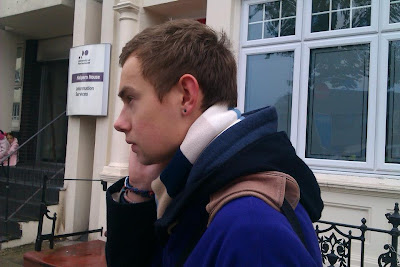A producer meeting was organised by Lucas Holzhauer for the
Monday whereby the producers from the 6 groups would meet to discuss the shows
format and ideas of content. Unfortunately, only 4 groups were represented at
the meeting so it was not as successful as first hoped. We decided that there
would be a weekly ‘Something Different’ segment, which was first introduced by
group 2 in the second week, yet not repeated since. We also would like to bring
in more courses from around Eldon building and the university as a whole, to
showcase their work. We also need to make sure we publicise the Facebook and
Twitter pages at the end of every show, and ensure the news is at the start of
the programme straight after the initial introduction.
On the Tuesday we had our first practice in the studio for
the live show we would be delivering on the Friday. I took up the role of
Production Assistant. I have been this role several times before and am quite
comfortable doing it whilst also enjoying the role.
The Prospects website outlines the role of a production assistant:
In this practice it became obvious that some of what the production crew want us to do within their show could be reasonably difficult to carry out. During the news, the crew in the studio have to bring in sofas for a sit down interview whilst in the gallery the Tricaster operator has to adjust the settings on the Tricaster for this to be framed well and look good. At the same time, the vision mixer must play the relevant video clip on the news background screen and place the CCi Live logo in between these clips. The set will then have to be switched back to a standing set during a later insert.
The Prospects website outlines the role of a production assistant:
Job Description
A television production assistant (or PA) is responsible for the administration, organisation and secretarial work involved in producing a television programme. While duties do vary from production to production, the work includes assisting actors and the crew, issuing scripts, dealing with travel and accommodation bookings and sorting out enquiries and other paperwork.
A production assistant may work on different kinds of programmes, such as news and current affairs, reality television shows, soap operas, dramas and comedies. They are usually involved at all stages of a project, working alongside everyone from early stages until completion.
Production assistants can specialise in one particular area of assistance or be known by other names, such as production coordinator, script supervisor or production secretary.
Typical work activities
Tasks often include:
- attending production meetings;
- typing, editing, copying and distributing scripts;
- organising travel arrangements for cast, crew and production executives;
- organising accommodation for cast and crew;
- typing and distributing schedules, or call sheets;
- assisting cast members, and at times running errands for them;
- running errands between the production office and other departments;
- dealing with accounts and expenses.
Assistants can also be involved in:
- checking running orders and scripts;
- keeping track of timings during a programme;
- setting up pre-recorded material in the studio gallery;
- making schedules, shot lists, logs and other paperwork for post-production.
AGCAS editors. (2012). Television Production Assistant. Retrieved October 31, 2012, from http://www.prospects.ac.uk/television_production_assistant_job_description.htm
In this practice it became obvious that some of what the production crew want us to do within their show could be reasonably difficult to carry out. During the news, the crew in the studio have to bring in sofas for a sit down interview whilst in the gallery the Tricaster operator has to adjust the settings on the Tricaster for this to be framed well and look good. At the same time, the vision mixer must play the relevant video clip on the news background screen and place the CCi Live logo in between these clips. The set will then have to be switched back to a standing set during a later insert.
Set redressing
Back to our own show, I helped record the voice-overs in a
sound studio. Firstly we used the sound studio’s own system to record a
voice-over, but the levels were too low when the clips were ingested into Avid.
Therefore we decided to record the rest of the voice-overs on a Zoom H2 Handy Recorder,
which proved quicker and more successful.
I was also in attendance during some of the editing process to see how it was coming together and make sure everything was okay.
The H2 begins with a simple idea: provide brilliant stereo recording in an easy-to-use, ultra-portable device. Now everyone can record pristine audio in an infinite variety of applications. From seminars and conferences, to electronic news gathering (ENG), interviews and podcasting, to musical performances, songwriting sessions and rehearsals, the H2 provides amazing recording quality. And no matter what kind of recording you want to make, the H2 can effortlessly record it.
Simplicity is a beautiful thing. (n.d.). Retrieved October 31, 2012, from http://www.zoom.co.jp/english/products/h2/
Zoom H2 Handy Recorder
I was also in attendance during some of the editing process to see how it was coming together and make sure everything was okay.
Unfortunately I had to make the decision to withdraw the
Diwali section of the show. This is because it took too long for the Hindu
society to reply to my email, and the script was already complete so we
couldn’t fit it in anywhere. We had also organised an interview with a runner
from the Great South Run as an alternative due to the lack of contact from the
society. We were also unsure about selectively speaking about only one
religion, which may be an issue in broadcasting, especially on the big screen.
We believed that if we spoke about Hinduism, there might be a requirement to
speak about other religions, possibly in future programmes, which cannot be
guaranteed.












